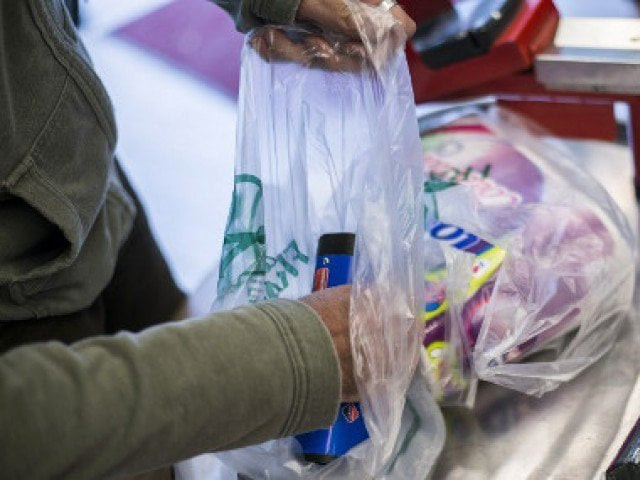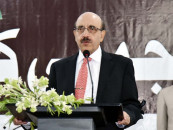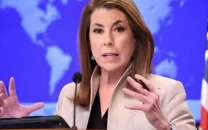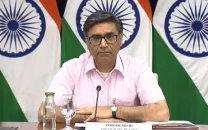Ceasefire brings no relief for exporters
Uncertainty, tariffs, and misinformation keep trade sector in crisis mode

Nearly two weeks after Pakistan and India agreed to a fragile ceasefire, the Pakistani business community, particularly exporters, remains gripped by anxiety.
With no clear timeline for peace talks between the two nuclear-armed neighbours, fears of renewed tensions loom large.
"War-like situations are disastrous for countries like Pakistan," said Ijaz Khokhar, a textile exporter from Sia
PHOTO: REUTERS
lkot. "Uncertainty is our biggest enemy right now. Export shipments are stuck, buyers are nervous, and every day without clarity costs us millions."
The ceasefire, brokered after four days of intense border clashes, has done little to ease the strain on exporters. Even before the conflict, they were grappling with the aftermath of Trump-era tariffs.
International buyers had initially cancelled orders when the US imposed tariffs on Pakistani goods, only to rush back after a 90-day pause was announced.
"Now, buyers want us to absorb half the tariff costs," Khokhar explained. "But our profit margins are already razor-thin. How can we survive like this?"
Compounding these challenges, a recent protest by Sindhi nationalists on the Indus Highway over water disputes brought logistics to a standstill.
"Trucks carrying export goods were stranded for days," Khokhar said. "We are racing against the clock to clear pending shipments before the US tariff pause expires. Delays could mean losing buyers permanently."
Misinformation during the conflict further rattled global clients. Fake news spread by Indian media claiming Karachi Port had been destroyed caused panic. "International buyers froze new orders overnight," said Nazir Saeed, a Karachi-based exporter. "They don't want their supply chains disrupted. Restoring their confidence will take months, if not years."
While US President Donald Trump recently expressed interest in boosting trade with Pakistan, exporters remain skeptical. "Trade deals depend on private-sector partnerships, not government announcements," Saeed noted. "We already work with American buyers.
Unless Pakistan diversifies its exports, like investing in value-added textiles or tech products, Trump's words won't translate into real growth."
Pakistan's economic fragility adds to the gloom. Despite the military's bolstered image post-conflict, the economy continues to wobble.
The International Monetary Fund (IMF) projects GDP growth at just 2.6% for the year 2025, far below the 5% needed to curb rising unemployment.
A recent $3 billion IMF bailout has come with harsh conditions like tax hikes, energy subsidy cuts, and currency devaluation.
"The IMF loan stabilised the rupee temporarily, but inflation is still at 28%," said economist Ayesha Malik. "Businesses are drowning in high input costs and low demand. Without structural reforms, recovery will remain elusive."
For exporters, the stakes are existential. Textiles, which account for 60% of Pakistan's exports, face fierce regional competition from Bangladesh and Vietnam.
"Global buyers demand sustainability and innovation," said business analyst Farhan Ahmed.
"Pakistani firms lack the technology and financing to upgrade.
Meanwhile, India and Bangladesh offer cheaper labour and better incentives."
Ahmed warns that reliance on traditional exports like raw cotton and leather could backfire. "The world is shifting toward value-added goods. If Pakistan doesn't adapt, its share in the US and European markets will keep shrinking."
However, despite the bleak outlook, some see a silver lining. The ceasefire, though precarious, offers a window for diplomacy.
"Peace talks could revive regional trade, especially with India," Malik said. "A reopened India-Pakistan trade route would cut costs and boost exports for both sides."
However, with elections approaching in India and political instability in Pakistan, few expect breakthroughs soon.
For now, exporters are left navigating a storm of uncertainty.
"We are tired of crises, tariffs, wars, protests," Saeed said. Pakistan's economy won't strengthen until leaders prioritise stability over short-term wins.
"Peace won't fix our economy unless we innovate. Global buyers need value, not excuses. Without upgrading, Pakistan will keep losing ground," he added.


























COMMENTS (1)
Comments are moderated and generally will be posted if they are on-topic and not abusive.
For more information, please see our Comments FAQ